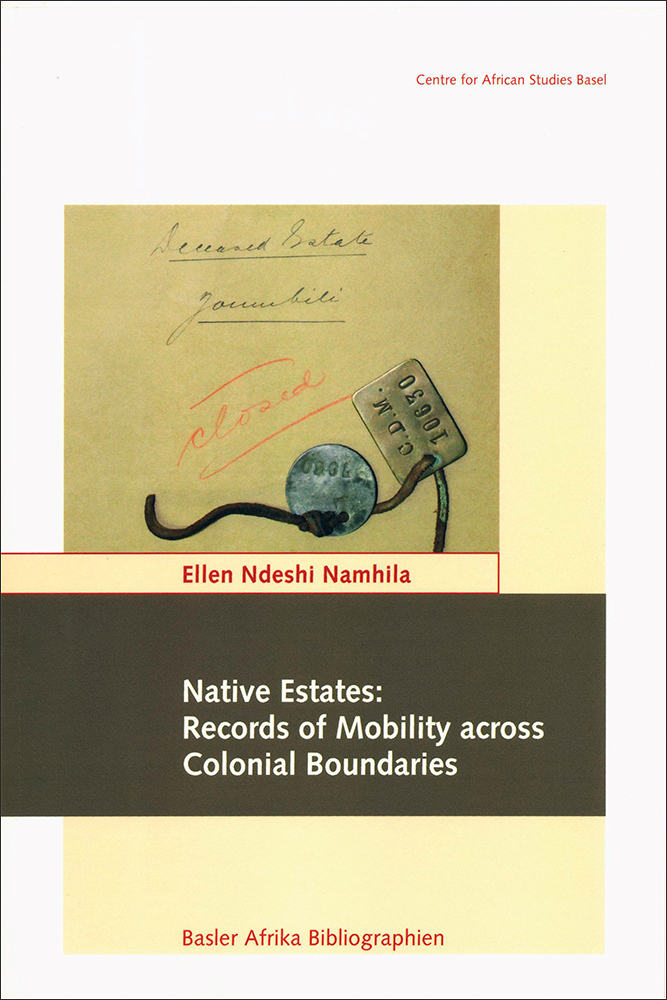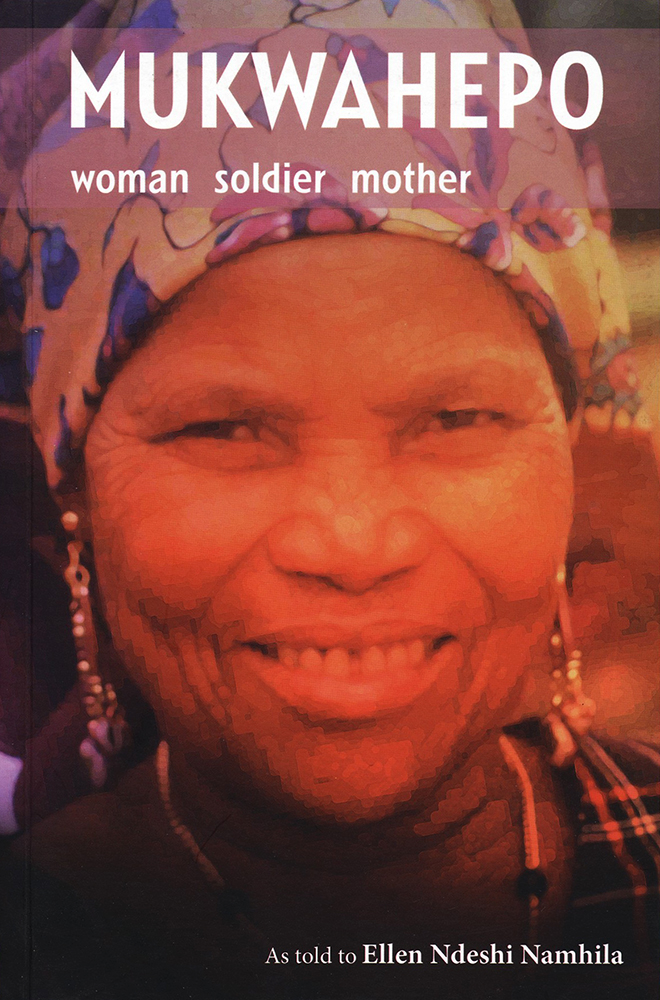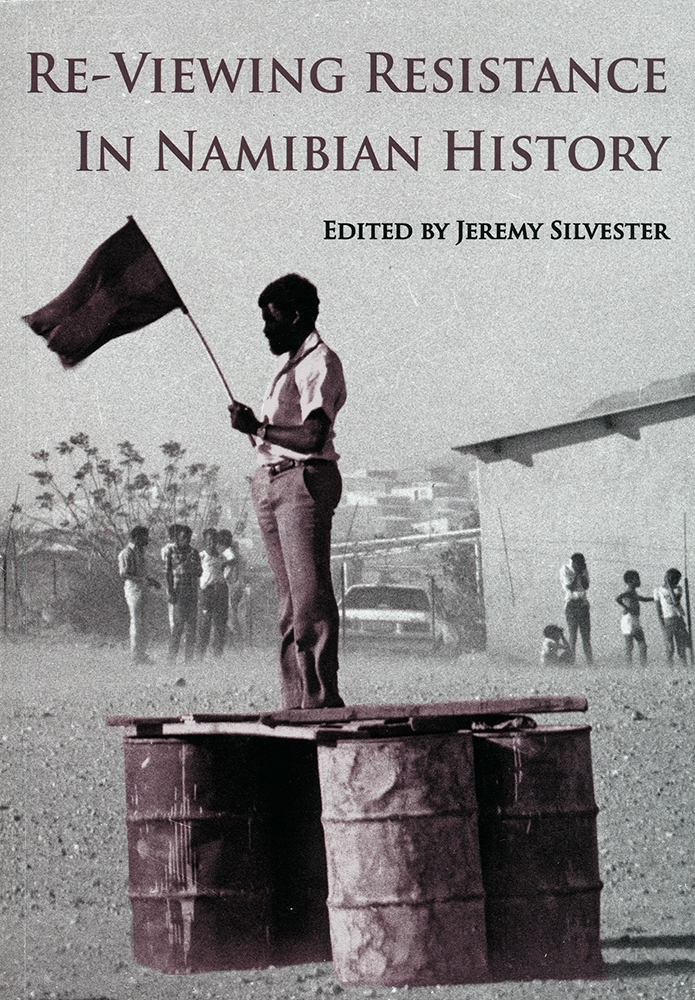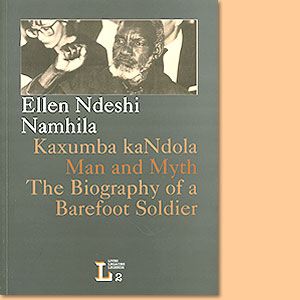Native Estates: Records of Mobility across Colonial Boundaries, by Ellen Ndeshi Namhila
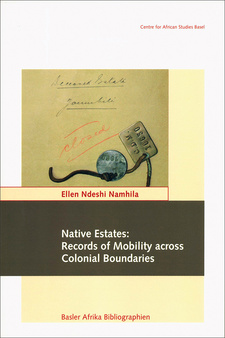
Native Estates: Records of Mobility across Colonial Boundaries, by Ellen Ndeshi Namhila. Basler Afrika Bibliographien. Basel, Switzerland 2017. ISBN 9783905758900 / ISBN 978-3-905758-90-0
Dr. Dag Henrichsen from the Basler Afrika Bibliographien has written the foreword to Ellen Ndeshi Namhila's study Native Estates: Records of Mobility across Colonial Boundaries.
African social history thrives in many ways on the passionate inclination by scholars to provide ordinary people with a "voice" and "experience", as does much of social history in general. We read archives along and against the grain; we define "gaps" and go to great lengths to explain these and how to work around them. We are critical of master narratives and of concepts as transmitted through and mediated by the archives, and we are critical of the very notions of "voice" and "experience". The archival turn has led us to reflect on the epistemic frameworks which underpin any archive or collection and which always mediate and often condition, and (re-)defin, the history of people about whom we write in the first instance. We de- and re-construct and then suggest a different, more nuanced or even new reading of archives, documents and narratives. We present discoveries from the archives and weave these into ambivalent, ruptured and always complex histories. These we regard as "incomplete" and surely fractured and limited histories. A general public might have other aspirations when turning to historical narratives and/or seeking out an archive. As Ellen Ndeshi Namhila, writer, scholar and policy-maker in the fields of Namibian libraries, archives, heritage and historical research, has shown in her various publications, the general, non-scholarly public is indeed often interested in "voices" and "experiences". Her research is rooted in current public history debates, interests and demands and has led her to research and publish "voices" and narratives of marginalised men and women, of people marginalised by, in part, master narratives of the liberation movements. In this lecture, she explains how current, postcolonial public needs and expectations for specific archival services—genealogical data and personal information of all sorts—led her into investigations of the epistemic foundations of the colonial records at the National Archives of Namibia. Her project became, in part, a research project on the history of that colonial and apartheid state's archives. Her research also targeted the archive of the National Archives, that particular site where the production and destruction of history and the resurrection and silencing of people and their pasts is, at least in theory, accounted for by archivists, and where the decision-making processes of the latter are, ideally speaking, documented. Here, she summarises her findings on the disturbing history of the lives and deaths of files of a particular group of records, estate records. She firstly presents us with the racialized social biography of files, fonds, collections, finding aids and databases of the colonial state archive in order to find explanations for the post-colonial public service failures of the National Archives of Namibia. By doing so she, secondly, presents us with, indeed, "voices" and "experiences" as mediated through the so-called Native Estate records, these having been either lost, neglected, ignored or destroyed. Namhila opens the files she eventually does find and suggests, in a true spirit of discovery, numerous new research questions and topics for Southern African history. Yet she does so without losing sight of what is at stake beyond these questions and topics: biographical data and personal information about deceased colonial subjects that are relevant for and often very crucial to their postcolonial relatives and heirs. Her case study of the social biography of records, and the glimpses she provides from the contents of their files on the social history of ordinary African people, link archives and social history with the demands of a postcolonial audience other than that of researchers and scholars. Her study, which will also be published in its comprehensive form by the Basler Afrika Bibliographien, is once again a passionate statement on the power of producing and silencing pasts and histories. Dag Henrichsen
This is an excerpt from Native Estates: Records of Mobility across Colonial Boundaries, by Ellen Ndeshi Namhila.
Title: Native Estates
Subtitle: Records of Mobility across Colonial Boundaries
Author: Ellen Ndeshi Namhila
Publisher: Basler Afrika Bibliographien
Basel, Switzerland 2017
ISBN 9783905758900 / ISBN 978-3-905758-90-0
Softcover, 16 x 24 cm, 46 Seiten
Namhila, Ellen Ndeshi im Namibiana-Buchangebot
Native Estates: Records of Mobility across Colonial Boundaries
Native Estates: Records of Mobility across Colonial Boundaries discusses a substantial corpus of about 11 000 so-called "Native Estates" files which previously were not accessible through the existing finding aids.
Mukwahepo: Woman Soldier Mother
The memoirs of Mukwahepo as a woman, soldier and mother beeing trained militarily by SWAPO, who was then sent to care for young Namibians who had left the country in the mid-1970s.
Re-Viewing Resistance in Namibian History
Re-Viewing Resistance in Namibian History brings together the output of experienced academics and a new wave of Namibian historians.

